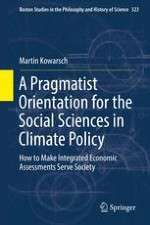2016 | OriginalPaper | Buchkapitel
11. Elements of a Guideline for Future Integrated Economic Assessments of the IPCC
verfasst von : Martin Kowarsch
Erschienen in: A Pragmatist Orientation for the Social Sciences in Climate Policy
Aktivieren Sie unsere intelligente Suche, um passende Fachinhalte oder Patente zu finden.
Wählen Sie Textabschnitte aus um mit Künstlicher Intelligenz passenden Patente zu finden. powered by
Markieren Sie Textabschnitte, um KI-gestützt weitere passende Inhalte zu finden. powered by
